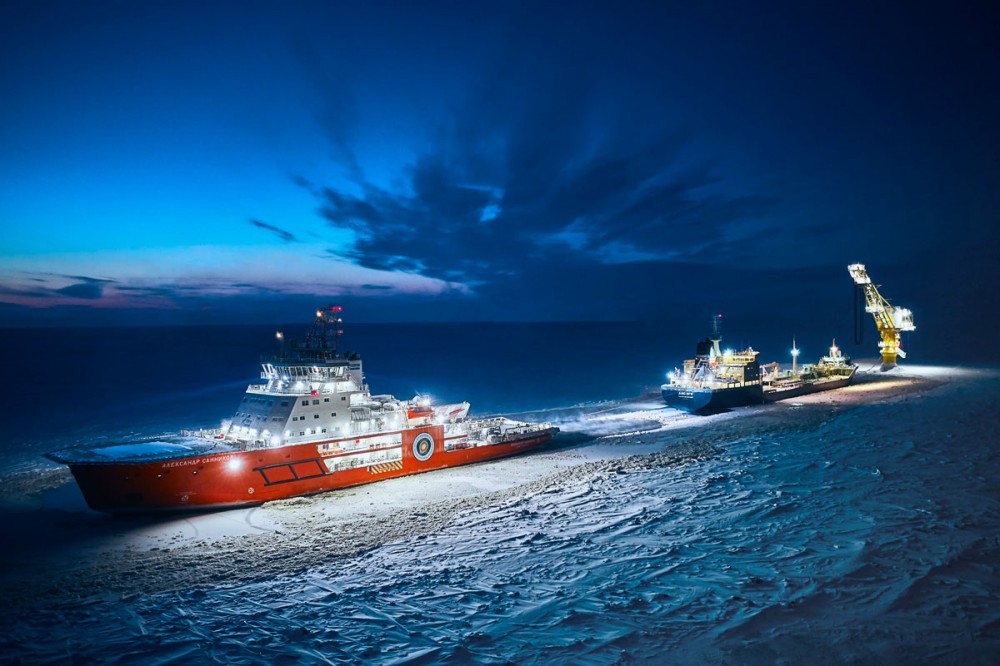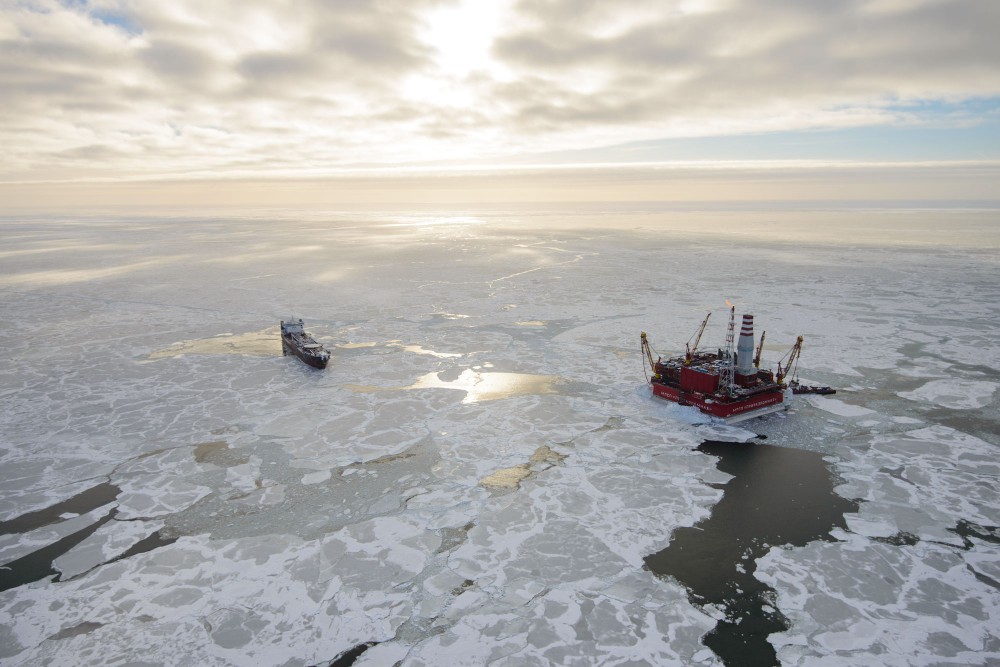Russian oil companies are desperately looking for new markets.
Nuclear icebreaker operator Rosatom now offers Lukoil and Gazprom Neft escort across icy Arctic waters to Asia.
From Barnets Observer by Atle Staalesen
The two companies that produce many million tons of oil at Arctic fields might soon start to send shiploads to Asian buyers across the Northern Sea Route.
According to Rosatom, the nuclear power company that manages Russia’s fleet of nuclear icebreakers, there is a significant potential in oil shipments on the Arctic route.
Negotiations with the oil companies are already taking place, Rosatom representative Sergei Chemko confirmed in a meeting in the Federation Council this week.
The two companies that produce many million tons of oil at Arctic fields might soon start to send shiploads to Asian buyers across the Northern Sea Route.
According to Rosatom, the nuclear power company that manages Russia’s fleet of nuclear icebreakers, there is a significant potential in oil shipments on the Arctic route.
Negotiations with the oil companies are already taking place, Rosatom representative Sergei Chemko confirmed in a meeting in the Federation Council this week.
He believes oil from Lukoil’s Varandei terminal and Gazprom Neft’s Prirazlomnoye project could be sent across the route to the Asia-Pacific region in the period of the year without massive sea-ice, Interfax reports.
In summer and fall, the shipments can be made without ice-class tankers, Chemko argued.
“Unfortunately, we do not yet have large-size tankers with ice-class and therefore we offer our colleagues use of ordinary tankers with a guaranteed level of security, with escort of our icebreakers in the summer- fall season,” he explained.
In summer and fall, the shipments can be made without ice-class tankers, Chemko argued.
“Unfortunately, we do not yet have large-size tankers with ice-class and therefore we offer our colleagues use of ordinary tankers with a guaranteed level of security, with escort of our icebreakers in the summer- fall season,” he explained.

Big logistical operations are surrounding Gazprom Neft’s year-round shipments of oil from the Novy Port field in Yamal. Today, the oil is shipped to a reloading facility in the Kola Bay. Photo: Gazprom Neft
Russia produces a significant share of its oil in far northern regions.
According to Gazprom Neft, Arctic fields today account for more than 30 percent of its total production. In 2020, production at the company’s Novy Port project increased five percent to a total of 14,89 million tons, and the offshore project Prirazlomnoye delivered 3,27 million tons, an increase of three percent year-on-year.
In addition comes oil from Lukoil’s Varandey terminal, expected to reach more than 6 million tons in 2022.
It is far from the first time that oil tankers sail on the Northern Sea Route.
It is far from the first time that oil tankers sail on the Northern Sea Route.
In October last year, the 257 meter long oil tanker Vasily Dinkov made it across the route to the Chinese port of Rizhao.
The voyage tool place shortly before the EU introduced its oil ban on Russia.
The voyage tool place shortly before the EU introduced its oil ban on Russia.
The Commission’s 6th package of sanctions, adopted in June last year, prohibits all purchase, import or transfer of crude oil and certain petroleum products from Russia to the EU.
Russian companies today sell oil to China, India and other so-called “friendly countries” with a great discount.
According to Member of the Federation Council Konstantin Dolgov, Russia is able to overcome the troubles created by the sanctions.
“The current geopolitical situation triggers difficulties in resolving certain issues, but it is not sufficiently critical for a review of our general development plans,” he said during this week’s Council meeting devoted to the Northern Sea Route.
In 2023, shipments on the route is estimated to reach 33,12 million tons, he said.
The sea-ice across the Russian Arctic has over the past decade undergone a dramatic shrink. Nevertheless, ice remains a major challenge for ships operating in the area even during summer and fall.
In November 2021, more than 20 ships got stuck in the remote area following a quick and early freeze of the waters.
Links :
- ABC news : Moscow is betting big on its Arctic shipping route as the costs of invading Ukraine continue to mount
- High North News : Norway Sees Greatest Increase in Arctic Shipping Traffic
- MarineInsight : Russia And India Discuss Development Of Northern Sea Shipping Route
- GeoGarage blog :Map shortcomings could hinder Northern Sea Route growth / The warmest ever winter on the Northern Sea Route / Container ship crosses Arctic route for first time in history ... / The future of the Arctic economy / Arctic shipping passage 'still decades away' / Arctic sea routes open as ice melts / SCF Baltica tanker completed the Northern Sea Route / Ships to sail directly over the north pole by 2050, scientists ... / Russian tanker sails through Arctic without icebreaker for ... / Chinese shipper on path to 'normalize' polar shipping / As Arctic ice vanishes, new shipping routes open / Polar powers: Russia's bid for supremacy in the Arctic Ocean / Why the Arctic is not the next' South China Sea / Oblique icebreaker gives better access to Arctic waters / The world map of the future might be vertical / Polar code agreed to prevent Arctic environmental disasters / These maps show the epic quest for a Northwest Passage / Arctic headache for ship insurers as routes open up / Arctic Ocean: history and now / Arctic satellite image of the week : Russia discovers a new ...

No comments:
Post a Comment